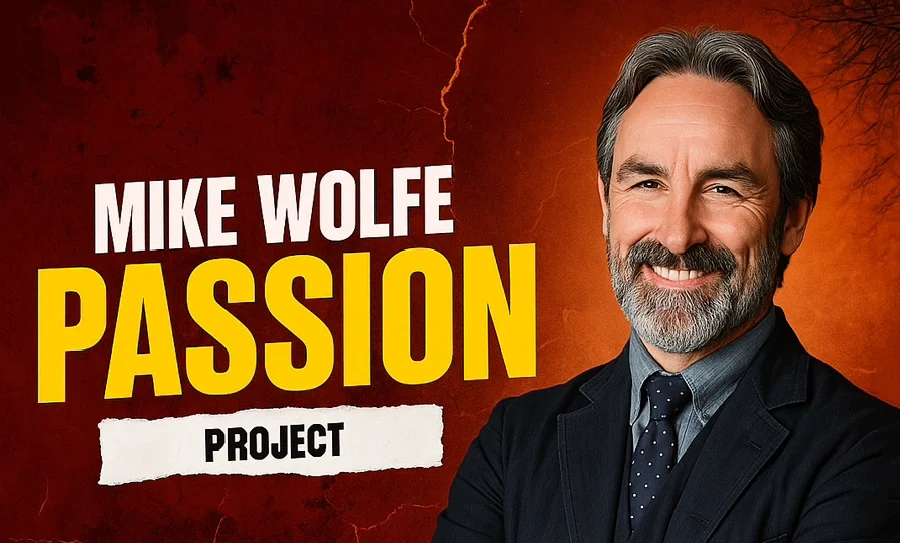If you’ve ever spent a lazy afternoon watching American Pickers, you know Mike Wolfe. He’s the guy with a keen eye, a relentless drive to turn down a dusty backroad, and an almost mystical ability to see a forgotten story in a rusted bicycle or a crumbling gas pump. But the show, with its antique shops and “money-making” deals, is merely the public face of a much deeper, more profound mission. Mike Wolfe’s true passion project isn’t just picking; it’s preservation, storytelling, and community revitalization.
What started as a childhood obsession with scavenging bike parts in his hometown of Joliet, Illinois, has evolved into a multi-faceted crusade to save the tangible pieces of American history before they are lost to time, neglect, or the landfill.
The Picker as Preservationist
For Wolfe, every object has a soul. A rusty sign isn’t just metal and paint; it’s a artifact from a time when roadside commerce was an art form. A pre-war motorcycle isn’t just a vehicle; it’s a testament to American ingenuity. His passion project is the antithesis of sterile museum curation. He believes history should be touched, heard, and experienced. This philosophy is physically manifested in his two flagship stores, Antique Archaeology in LeClaire, Iowa, and Nashville, Tennessee.
These are not mere retail outlets; they are museums where the exhibits are for sale. They are the culmination of the hunt, places where the treasures he rescues are displayed with reverence and context. Walking through them, you feel Wolfe’s guiding hand—the careful arrangement of petroliana (gas station memorabilia) alongside vintage folk art, each piece with a tag that often hints at its origin story. This is curation with a purpose: to connect people with the past in an accessible, visceral way.
Beyond the TV Show: Revitalizing Main Street
Wolfe’s passion extends far beyond the objects themselves to the very architecture that housed the industries and lives that used them. A significant part of his off-camera work is the restoration of historic buildings.
In Nashville, Tennessee, he has become a pivotal figure in the revitalization of the historic Marathon Village, a former automobile factory he helped transform into a vibrant hub for artists, small businesses, and artisans. He didn’t just open a store there; he invested in the community, breathing new life into a forgotten landmark. Similarly, in his hometown of LeClaire, his presence has helped spur economic growth and preserve the small-town charm he so clearly cherishes.
This isn’t just savvy business; it’s a statement. By saving these buildings, Wolfe is preserving the physical stage upon which American stories unfolded. He’s ensuring that the workshops, factories, and main streets that built the nation have a future, not just a past.
The Story is the Treasure
Perhaps the most critical element of Wolfe’s passion is his role as a storyteller. The real “find” for him is never the monetary value of an item, but the narrative attached to it. He spends hours with collectors like the legendary “Jack,” not just to negotiate a price, but to listen. He understands that these aging hoarders are living libraries, and their collections are the last chapters of a fading America.
This dedication to storytelling is evident in his other ventures, like his production company, America’s Lost Treasures, and his books. He uses his platform to amplify the stories of everyday people and their extraordinary collections, ensuring that the history behind the object is recorded and celebrated.
A Legacy of Salvaged Souls
Mike Wolfe’s passion project is a powerful reminder that history isn’t confined to textbooks. It’s sitting in a barn in Iowa, rusting behind a hedge in Kentucky, or crumbling on a forgotten main street. His life’s work is a call to action—an invitation to look closer, to ask questions, and to appreciate the beauty and stories embedded in the everyday objects of our past.
He is more than a picker; he is a preservationist, a community builder, and America’s foremost storyteller of forgotten things. In a throwaway culture, his passion project is a testament to the enduring value of what we leave behind, proving that one person’s junk is truly another’s—and our nation’s—priceless heritage.

